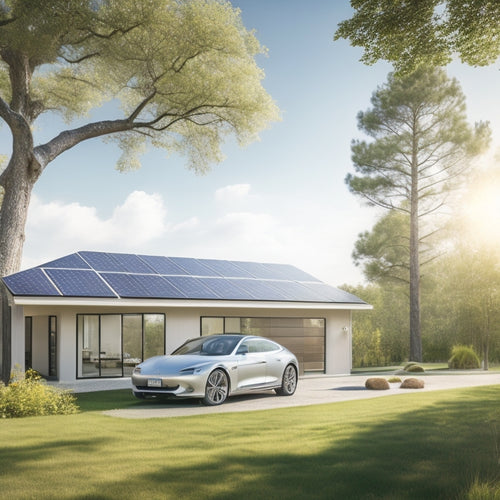
Affordable Residential Systems: A Step-by-Step Guide
Share
You're looking to create an affordable residential system that reduces your energy costs and environmental footprint. To get started, you'll need to choose the right solar panels, assess your energy needs, and select a reputable installer. Then, familiarize yourself with system components and follow installation and maintenance guidelines. By prioritizing regular upkeep and incorporating energy-efficient strategies, you'll maximize your savings. As you take the first steps towards a more sustainable future, you'll uncover more ways to optimize your system and reap the benefits of affordable residential systems.
Key Takeaways
• Assess your energy needs by calculating daily energy usage in watt-hours to determine the required system size and efficiency.
• Select high-quality solar panels that match your energy needs and complement your home's design for optimal performance.
• Choose a reputable installer with certifications like NABCEP or IAEI to ensure a smooth and efficient installation process.
• Regular maintenance is crucial to ensure optimal system performance, so prioritize system inspections and create a regular upkeep schedule.
• Maximize savings by incorporating energy-efficient appliances, smart devices, and taking advantage of financial incentives to reduce energy consumption and utility bills.
Choosing the Right Solar Panels
When selecting solar panels for your residential system, you need to consider the type and quality of the panels, as they directly impact the overall performance and efficiency of your solar array. The type of panel you choose will affect the amount of energy you can generate, and the quality will influence the system's lifespan.
You should also take into account warranty options when choosing solar panels. Look for manufacturers that offer thorough warranties covering performance, materials, and workmanship. A good warranty can provide peace of mind and protection for your investment.
In addition to performance and warranty, panel aesthetics should also be a consideration. You'll want to select panels that complement your home's design and architecture. Modern solar panels come in various styles, from sleek and slim to more traditional designs. Some manufacturers even provide custom color options to ensure the panels blend seamlessly with your roof.
Assessing Your Energy Needs
To determine the size and number of solar panels you need, you'll need to calculate your daily energy usage in watt-hours, taking into account your home's appliances, lighting, and electrical devices. This calculation will help you determine the capacity of the solar panel system required to meet your energy demands.
Start by gathering your past utility bills to get an idea of your average daily energy consumption. You can also conduct an energy audit to identify areas of energy inefficiency in your home. This will help you pinpoint opportunities to reduce your energy usage and optimize your solar panel system.
Next, make a list of all the appliances, lighting, and devices in your home, along with their respective wattage and usage hours. This will give you a detailed picture of your energy needs.
You can then use online tools or consult with a professional to calculate your total daily energy usage in watt-hours. By accurately evaluating your energy needs, you'll be able to design a solar panel system that meets your energy demands efficiently and effectively.
Selecting a Reputable Installer
With a clear understanding of your energy needs, you're now ready to find a reputable installer who can design and install a solar panel system that meets your specific requirements. This is an important step, as a qualified installer can guarantee a safe, efficient, and cost-effective system.
To begin, research local installers and ask for referrals from friends, family, or neighbors who've already gone solar. Local referrals can provide valuable insights into an installer's work quality, professionalism, and customer service.
When researching installers, look for credentials such as certifications from the North American Board of Certified Energy Practitioners (NABCEP) or the International Association of Electrical Inspectors (IAEI). These credentials indicate that the installer has the necessary knowledge and expertise to design and install a high-quality solar panel system.
Additionally, check online reviews, ratings, and testimonials to get a sense of an installer's reputation and customer satisfaction. By doing your due diligence, you can find a reputable installer who'll help you achieve your energy goals while ensuring a smooth and successful installation process.
Understanding System Components
As you explore affordable residential systems, you'll need to comprehend the individual components that make up the system.
You'll want to familiarize yourself with the system hardware components, including inverters, mounting systems, and monitoring tools.
Additionally, you'll need to take into account the quality of the solar panels themselves, as this will directly impact the system's overall performance and energy output.
System Hardware Components
You'll need several key system hardware components to build an affordable residential system, including a central processing unit (CPU), memory (RAM), and storage devices. These components are essential for top-notch system performance and reliability.
When selecting your CPU, consider its processing power, number of cores, and energy efficiency. A CPU with a high processing power will enable your system to handle demanding tasks efficiently. Adequate RAM is also important for multitasking and reducing system lag.
For storage, you can choose between hard disk drives (HDD) or solid-state drives (SSD). SSDs offer faster data access and are more energy-efficient.
Component durability is critical for long-term system reliability. Look for components with a proven track record of durability and resistance to environmental stressors. Energy efficiency is also crucial, as it reduces your system's carbon footprint and saves you money on energy bills. Opt for components with low power consumption and high performance.
Solar Panel Quality
Choosing high-quality solar panels is important to ensuring your affordable residential system operates at peak efficiency, as the panels' performance directly impacts the amount of energy generated. When selecting solar panels, you should consider factors such as panel durability, warranty options, and efficiency ratings. A high-quality solar panel will withstand harsh weather conditions and maintain its performance over its lifespan.
Here's a comparison of different solar panel quality factors:
| Panel Type | Efficiency Rating | Warranty Options |
|---|---|---|
| Budget-Friendly | 15% | 10-year warranty |
| Mid-Range | 18% | 15-year warranty |
| Premium | 20% | 25-year warranty |
As shown in the table, premium solar panels offer higher efficiency ratings and longer warranty periods, ensuring top performance and reliability. While they may be more expensive upfront, they provide better value in the long run. When investing in an affordable residential system, it's important to prioritize solar panel quality to maximize energy generation and reduce maintenance costs.
Installation and Maintenance Tips
As you prepare to install and maintain your affordable residential system, it's crucial to prioritize a thorough system inspection and regular upkeep.
You'll want to create a system inspection checklist to make sure all components are functioning correctly and identify potential issues before they become major problems.
System Inspection Checklist
Regular system inspections are crucial to guaranteeing your residential system operates efficiently and safely, and a thorough checklist helps you identify potential issues before they become major problems. By inspecting your system regularly, you can prevent costly repairs, reduce energy consumption, and maintain a safe living environment.
When conducting a system inspection, make sure to check the following:
-
Roof Condition:
Inspect your roof for damaged, missing, or loose shingles, curled or buckled shingles, and signs of wear around chimneys, vents, and skylights. -
Electrical Safety:
Check for flickering lights, warm outlets, and burning smells, which can indicate electrical issues. Ensure that all electrical panels and circuit breakers are easily accessible. -
System Components:
Verify that all system components, including HVAC units, water heaters, and generators, are properly installed, level, and securely fastened.
Regular Maintenance Schedule
Establishing a regular maintenance schedule helps you stay on top of your residential system's upkeep, guaranteeing it runs efficiently and prolonging its lifespan. By setting aside time for routine checks and tasks, you'll avoid costly repairs and unexpected downtime.
Start by scheduling seasonal cleaning sessions to remove dirt, debris, and other obstructions that can hinder performance. This is especially important for systems with outdoor components, like solar panels or HVAC units.
Create a calendar reminder to inspect and clean your system every 3-6 months. During these sessions, inspect for signs of wear and tear, and address any issues promptly.
Additionally, prioritize emergency preparedness by having a plan in place for unexpected outages or malfunctions. Identify a trusted service provider or technician who can respond quickly in case of an emergency.
Keep a record of your maintenance activities, including dates, tasks performed, and any repairs made. This will help you track your system's performance and identify potential issues before they become major problems.
Maximizing Your Savings
By incorporating energy-efficient appliances and smart home devices into your residential system, you can greatly reduce your energy consumption and lower your utility bills. This not only helps the environment but also saves you money in the long run.
To maximize your savings, consider the following:
-
Energy Efficiency: Invest in energy-efficient appliances and lighting systems, which consume much less power than traditional alternatives.
-
Financial Incentives: Take advantage of government-backed financial incentives, such as tax credits and rebates, for adopting energy-efficient solutions.
-
Optimize Your System: Regularly monitor and adjust your residential system to make sure it's running efficiently, minimizing energy waste and reducing your carbon footprint.
Frequently Asked Questions
Can I Install a Solar Panel System Myself?
You can attempt to install a solar panel system yourself, but be aware of DIY challenges like complex electrical connections and roof penetrations, which pose safety concerns, such as electrical shock and falls.
Will Solar Panels Increase My Property Value?
Similar to a golden key opening a treasure chest, solar panels can enhance your property value, as a property appraisal will likely reflect the increased value of energy efficiency, making your home more appealing to potential buyers.
Are There Any Incentives for Nonprofits or Charities?
You can explore grant opportunities, such as the Department of Energy's State Energy Program, and tax exemptions, like the Federal Solar Investment Tax Credit, to support your nonprofit or charity's sustainable energy initiatives.
Can I Use Solar Panels With a Septic System?
You're considering harnessing solar power in rural living, where septic systems reign. Rest assured, you can use solar panels with a septic system, as long as you prioritize water conservation and efficient wastewater management.
Do Solar Panels Work During a Power Outage?
You'll be happy to know that solar panels themselves don't provide power during a grid outage, but with a battery backup system, you can achieve grid independence and enjoy backup power when you need it most.
Related Posts
-

Why Go Green With Automotive Products Online?
By switching to eco-friendly automotive products online, you're taking a significant step towards reducing your carbo...
-

Why Invest in Solar Car Battery Chargers Online?
By investing in a solar car battery charger online, you're not only reducing your reliance on fossil fuels but also o...
-

Top 7 Portable Solar Car Battery Solutions Online
You're in luck with our selection of reliable portable solar car battery solutions that meet your needs and budget. O...


